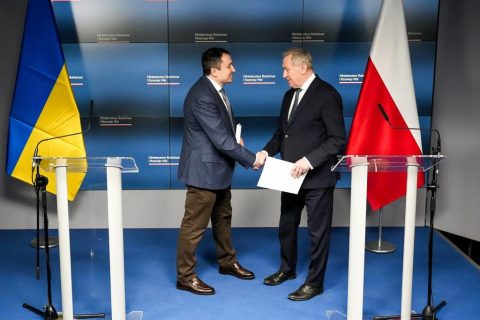Ukraine and Poland introduce customs seal for grain transportation

6 March 2023
Starting from today, Monday 6 March, official customs seals must be applied to each railroad car transporting grain from Ukraine via Poland. These seals will be checked, but not removed, at the border crossings, ensuring shorter waiting times and less congestion.
This was the outcome of a meeting held in Warsaw on 3 March, involving the Minister of Agrarian Policy and Food of Ukraine and the Minister of Agriculture and Rural Development of Poland. In February, veterinary border controls between the two countries significantly increased, causing notable delays and queues at border crossings. The new agreement, according to the parties involved, is expected to alleviate these problems. However, grain destined to the Polish market will still be checked at the border crossings.
On the other hand, transportation of Ukrainian grain via the Izov-Hrubieszow rail border crossing between Poland and Ukraine has been prohibited since 27 February until further notice. However, the official causes for this decision were not disclosed. The ban at this border crossing does not only include grain, but also seeds, seed oil, fruit, plants, and fodder.
The new agreement between Poland and Ukraine
According to the new arrangement, “the carrier will be obliged to put seals on each railroad car”. These seals will be checked at the Polish-Ukrainian borders by the Polish National Revenue Administration (KAS). However, the seals will only be removed by KAS officials once the cargo reaches the Polish ports of Gdansk, Gdynia, or Swinoujscie. If the Ukrainian grain has to transit to Poland to reach other EU Member States, the seals will be removed once the cargo arrives at the destination country. This means that veterinary border controls will not be carried out by Polish authorities, provided that the official seals are applied.
Once the cargo reaches the location designated for the removal of the seals, a record will be available through the New Computerised Transit System (NCTS). NCTS is a system of electronic declaration which replaces the paper-based procedure with an exchange of electronic messages. If there are any discrepancies between the declared and actual unloading location, Ukraine will suspend the responsible forwarders from further transportation operations. As the Ukrainian Minister of Agrarian Policy and Food highlighted, the new regime is implemented starting today, Monday 6 March.
RailFreight Summit Poland
Do you want to discuss rail freight between Poland and Ukraine with experts in the field? This topic is high on the agenda at the RailFreight Summit Poland, which is taking place on 19 & 20 April in Warsaw. The BAP will be one of the speakers engaged in the discussion. You can find the programme here, and register here.
Are you a gamechanger in the rail freight industry? And do you want to spread the word? Railfreight.com is currently producing its first-ever magazine, titled The Gamechangers of the Industry. Your company can be included in this magazine. Interested? You can find more information on this webpage.
morenews
Networking dinner 1
Networking dinner Networking is the most crucial element of RailFreight Summit! On the evening of 16 April 2024 from 18:00-21:00, a networking dinner will take place. This seated dinner offers the perfect opportunity to get together with your fellow industry professionals in a formal setting. Enjoy a multiple-course dinner, and drinks while making important new… Read more ›
How can this new terminal boost EU-Balkans intermodal transport?
On 19 April, Rihard Dobo will also speak at the RailFreight Summit Poland. He will explain the significance of the Horgos Terminal project and its potential to boost intermodal traffic to and from the Western Balkans and the broader southeast Europe region. The Serbia-Hungary bottleneck “As Serbia and the wider Western Balkan region is not… Read more ›
Malaszewicze upgrade may be financed by Polish government
The EU has in fact decided not to fund the modernisation project planned in the Małaszewicze Transshipment Area. The area includes the terminals Kobylany, Małaszewicze, Bór, and Chotyłów. This project was put on hold, waiting for possible public funds, which now may be on their way. To see this crucial transshipment area with your own… Read more ›
